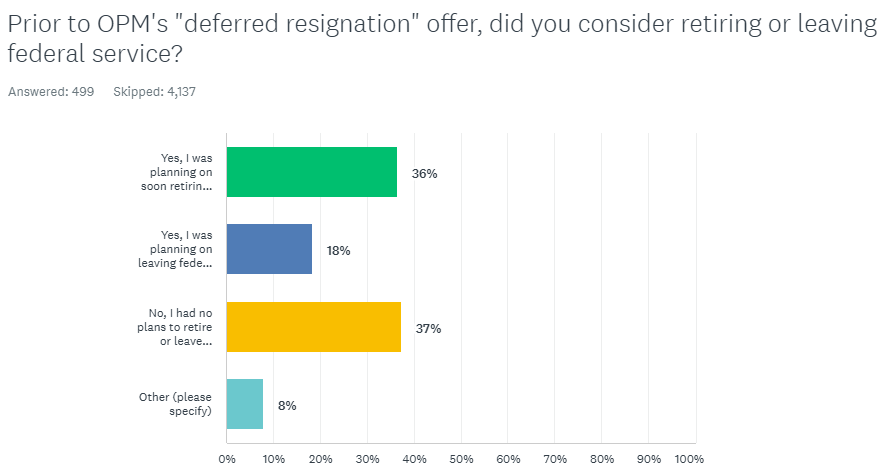Survey: Most feds say OPM’s resignation offer too uncertain to accept

Survey: Most feds say OPM’s resignation offer too uncertain to accept
By Jory Heckman
A significant majority of federal employees who took a Federal News Network survey say they don’t plan on accepting the Office of Personnel Management’s offer to resign and go on paid administrative leave.
In a survey of 4,619 federal employees, more than three-quarters of respondents said they don’t intend to accept the deal OPM sent to most civil federal workers in a mass email Tuesday afternoon.
“I want to be employed as a federal civilian as long as possible,” one respondent said. “I worked too hard to get in the federal government to give it away. I love my job and what I do for America.”
Employees who choose to resign will have to let OPM know of their decision by Feb. 6 — by replying to its email with the word “resign.”
In a survey of 4,619 federal employees, more than three-quarters of respondents said they don’t intend to accept the deal OPM sent to most civil federal workers in a mass email Tuesday afternoon. According to OPM’s email, employees would be placed on paid administrative leave until the effective date of their resignation, which OPM said should be no later than Sept. 30.
“I understand my employing agency will likely make adjustments in response to my resignation including moving, eliminating, consolidating, reassigning my position and tasks, reducing my official duties, and/or placing me on paid administrative leave until my resignation date,” the email states.
The email advises federal employees that the Trump administration may also pursue involuntary layoffs: “At this time, we cannot give you full assurance regarding the certainty of your position or agency but should your position be eliminated you will be treated with dignity and will be afforded the protections in place for such positions.”
More than 500 respondents — about 11% of those who took the poll — said they intend to accept the deal.
Among those who expect to accept the offer, 54% said they already had plans to retire from federal service soon, or leave for a job outside the federal workforce.
“After the election, I began to think about a VSIP or VERA (if offered),” one respondent wrote, referring to the federal government’s authority to offer buyouts and early retirement offers. “The proposal by the Trump administration pays better than these other plans.”

Several respondents said they intend to take the offer, after President Donald Trump signed an executive order on his first day in office calling on federal employees to return to the office full-time.
“We have established ourselves as being very efficient at working remote, and that is arbitrarily being taken from us,” one respondent said. “We are being asked to return to the office to then get on virtual meetings because we are so geographically dispersed. Pointless.”
Others felt inclined to accept OPM’s deal after Trump signed an executive order to reclassify tens of thousands of federal positions, and make it easier to fire the career employees who hold them.
The executive order essentially revives the “Schedule F” executive order Trump signed late in his first term, but did not implement.
“With the upcoming reclassification of so many positions, my job security became precarious at best. Definitely causes one to consider other employment options before there are none,” one respondent said.
Other federal employees plan on accepting OPM’s deal — but don’t intend on leaving federal service for good.
“Federal vacation until I start reapplying for fed jobs after September 30th,” one respondent wrote.
In a frequently asked questions page on its website, OPM said accepting the deal “does not affect your ability to apply to work for the federal government in the future.”
About 70% of respondents said they don’t have enough information from OPM to make their decision either way. Many said OPM hasn’t provided enough details on what accepting the deal would mean for their health and life insurance plans, or whether it would impact their pensions.
